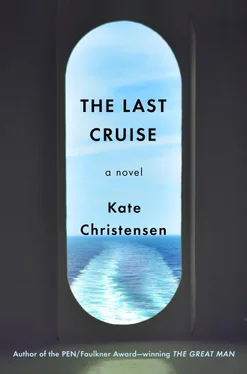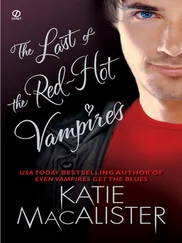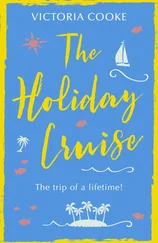He had come down here with the sort of half-idea of throwing himself into the churning ocean. There were worse ways to die. Drowning was supposed to be pretty pleasant, he’d heard. Once you gave yourself over to it.
He pictured his body drifting down through the black depths to the ocean floor. It was so typical; of course he had ended up with the best friend instead of the girl he was in love with. He was always selling himself short, shooting himself in the foot. Just like with Laurens, with the Eszterházy. He wasn’t capable of taking action beyond the bounds of his place in the world. Instead he was stuck watching, standing by, while other people took what they wanted, as if his own life, his own future, didn’t matter. And it didn’t. Not anymore, anyway.
He shivered. It was getting cold. The waves had picked up and were splashing over the side of the dock, spray hitting his face. He’d eaten so little last night, drunk so much wine. His lungs felt burned. The back of his throat ached.
As he stared into the water, he saw a shadow moving across the dark bars of stormy sunlight. Looking up, he almost fell off the platform. It was a boat, but Mick was sure at first that he was hallucinating. It was a catamaran, with a sleek white spaceship-like cabin sitting between its two hulls. A massive, rigid sail lined with solar panels stuck straight up from its middle like a fin. More solar panels were mounted on the roof of the cabin, as well as two small windmills. Even more surreally, four blond, tanned children stared at him over the side. They were waving at him. Smiling. Holding iPhones, taking pictures.
The Solar Wind slid over to the Queen Isabella without a sound. No noisy engine, no sails or ropes flapping in the breeze. It was no wonder Mick hadn’t known it was there until it was right on top of him. A man waved at him from the cockpit on deck. He was as blond and tan as the children.
“We’ve been hearing about you guys for days,” the man said, shouting over the wind. “I can’t believe you’re still stuck out here!”
A woman’s head, blond also, appeared. “I can’t believe we found you!” she said. “Hi! Do you speak English?”
Mick stepped back and clutched the doorway. “Where are you from?” He half expected them to say “outer space.”
“Palo Alto,” the man called back. “Here, catch!” The man maneuvered closer to the platform, and the tallest of the blond kids threw Mick a line. Mick caught it and tied the end of it to a cleat at the back of the platform, looping it around three times and under itself and tightening the end, hoping it would hold. The man handed the steering over to a teenage boy Mick assumed was another son and went over to join his wife and the other kids at the railing.
“I’m Skip Henderson,” he called. His longish hair blew off his high bony forehead. “This is my wife, Phoebe, and our kids. We’re on our way to Hawaii.”
“Mick Szabo,” Mick yelled back. He felt lightheaded, crazed, as if his eyes were bulging out of his head. “I am the chef.”
“Beautiful ship!” Skip was looking up at the side of the Isabella, leaning back and craning his neck. He seemed very excited to be here. “Is everyone okay on board?”
“We’re okay, yes,” called Mick. “A lot of people are sick.”
“I heard you had a fire,” Phoebe said, keyed up, her voice high on the wind. “It’s all over the news. I can’t believe we found you.”
“What a piece of luck, right?” Skip shouted. “We saw some flickering lights last night, and heard music. We thought we were going crazy. But when it got light, there you were.”
“Dad,” a boy yelled, “can we take the dinghy over?”
“No, stay there, Connor, we gotta book in like three minutes.”
Mick heard pounding footsteps behind him. “Hello!” came Kimmi’s high, clear voice. “Ahoy!”
Two young men in uniform tumbled through the long, narrow gear room behind her and jumped onto the small landing dock. They had obviously flung themselves down the stairs and were breathing hard.
“I’m Kimmi,” she yelled. “And these are the bridge officers, Ivan and Eduardo. The captain and some of the other officers are sick with norovirus.”
Mick looked at the three of them on the little dock, seeing them through Skip and Phoebe Henderson’s eyes, knowing he looked exactly as filthy, sweaty, and unhinged as they did. It was as if these people had emerged out of civilization, out of real life, a proper well-fed normal family on a clean, modern boat, to find a band of stranded savages, gone mad on their creaky old desert island.
“So listen,” Skip was saying. “We’re going to have to get out of here pretty quickly. There’s a nasty storm on the way, and we have to stay ahead of it.”
“A storm,” Ivan said. “Is it going to hit us?”
“Yeah. You’re going to get blown around some. Do you have any navigational capabilities?”
“No,” said Ivan. “No power at all.”
“I was just telling Mick here, you’ve been on the news. Phoebe just put a photo up on Twitter. It’s all over the Internet already.”
“People are retweeting it like crazy,” said Phoebe, looking at her smartphone.
A big swell moved under them, and then another. A wave broke against the low dock, splashing everyone on it.
“This is a total trip,” said Skip. “I cannot believe we ran into you. You’re on the edge of the void. There’s no one out here.”
“Except you,” said Mick.
“By sheer luck. We were headed for Hawaii but we decided to take a detour because we wanted our kids to see the reality firsthand. We just sailed through hundreds of miles of trash. It’s outrageous. Just north of here. Otherwise we wouldn’t have run into you.”
“You’re headed to Hawaii?” Ivan asked.
“Yeah,” said Skip. “I wish we could give you a tow. Or take you all aboard.”
Mick glanced over at Eduardo, Kimmi, and Ivan. They were all staring at the Hendersons with identical rapt, yearning expressions, hungry to keep them and their boat there, not let them go on their safe and merry way with their radio and food and Internet and children and clean clothes.
*
Christine stood at the portside railing, surrounded by people. The wind blew hard into everyone’s faces and whipped them with globules of cold spray as they all looked down at the Solar Wind below, the top of its magnificent solar sail reaching almost to their feet.
With warmth, even tenderness, Christine watched Mick among the people below on the excursion dock. His untucked shirttails blew around his torso. She studied his dark, unhappy face as the officers and Kimmi talked to the people on the catamaran.
“What are they saying?” said someone near Christine.
“Look at those kids,” said someone else.
“How did they find us?”
“Who are they?”
“They have Wi-Fi,” a woman said in a low voice just to Christine’s right. She was looking at her iPhone. “Look, I’ve got a signal.”
A flurry swept along the deck as other people appeared nearby, turning on their cell phones for the first time since the power outage, stabbing and mashing at them as fast as they could. Others held them to their bewildered faces as if they expected the boat to be equipped with its very own cell tower as well as a Wi-Fi antenna.
Christine thought briefly about e-mailing Ed, but her mind went blank trying to imagine what she’d say to him. She felt a hand slide onto her arm. Without turning to look, she put her hand on Valerie’s and pulled her in close.
“Did you bring your phone up here?” Christine asked. “Everyone’s e-mailing. Except me.”
Читать дальше












